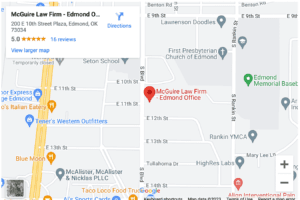Loss of Consortium

There are many different types of damages a person sustains when they are injured in an accident or because of someone’s other negligent behavior.
Economic damages can include medical bills, lost wages, and other financial losses. Non-economic damages may include physical pain and suffering, mental anguish, and permanent disabilities.
However, there is another type of damage associated with personal injury cases.
These damages are based on the family of the victim rather than the victim themselves. It is called a loss of consortium claim.
What is Loss of Consortium?
A loss of consortium claim occurs when a person’s injuries or death deprives their family of the benefits of a family relationship with the person. Title 23 of the Oklahoma Statutes includes consortium as a non-economic damage.
It also includes it as a future damage, meaning a damage that may occur after a case is decided.
Victims of numerous types of accidents and injuries can experience loss of consortium, and so can their families. Loss of consortium cases may exist when people are injured in:
- Slip and fall accidents
- Car accidents
- Truck accidents
- Construction accidents
- Accidents involving defective products
- Dog attacks
- Premises liability accidents
- And many other types of personal injury cases
Family members may also incur a claim for loss of consortium for a wrongful death caused by a personal injury.
The purpose of filing a loss of consortium claim is to seek compensation for the loss of:
- Marital relations - including the loss of companionship, affection, emotional support, a sexual relationship, and inability to have children
- Household services - including raising children, household chores, and running errands
- Parental relationship - including protection, guidance, love, care, support, and affection
In other words, the plaintiffs in loss of consortium cases seek compensation for losing the benefits of a relationship because their family member was injured or killed because of someone’s wrongful acts or negligence.
How Do You Prove There is a Loss of Consortium?
To recover compensation for a loss of consortium claim, you must prove that the aspects of the family relationship existed before the accident. In other words, did you have a close, loving relationship with your spouse before he was killed in a pedestrian accident?
Is there evidence that a family member contributed to household chores and actively participated in their children’s lives? In many cases, the evidence for a loss of consortium claim is the testimony of the plaintiff, the injured person, friends, and other family members.
If a couple needs to hire someone to perform services that an injured spouse performed before the accident, it is important to keep detailed records and receipts of the payments. For example, did the couple need to hire someone to clean the house, cook, and take care of the children because one spouse could no longer perform these tasks after a car accident?
It can also help to keep a journal documenting the emotional impact of the accident on the plaintiff and other family members. Did a spouse or children need counseling to deal with anxiety and depression after losing a family member? How did the absence of a family member impact the daily lives of the other family members?
Valuing a Loss of Consortium Claim
Putting a price tag on someone’s life or contributions to family members is impossible.
A person’s contribution to the family is worth far more than the person could earn during a lifetime — or a jury could award for a loss of consortium claim.
However, the justice system cannot undo the damage caused by personal injuries or wrongful death. The only means of compensating the family members who suffered a loss is to award a monetary judgment. A monetary judgment does not ease the emotional pain or suffering a child or parent experiences due to the injuries or death of a loved one.
However, a judgment can help the family pay for services such as childcare, help with household services, and other needs that the family might have because of a family member’s injury or death.
Jury members determine how much to award for a loss of consortium claim. The more evidence the plaintiff can present that a loving, caring, intimate relationship existed between the plaintiff and the injured or deceased spouse, the more likely the jury is to believe the loss of consortium claim and award a higher judgment amount for the claim.
The Time to File a Loss of Consortium Claim is Limited
As with other types of personal injury claims, your time to file a lawsuit seeking compensation for loss of consortium is limited. The Oklahoma statute of limitations sets a deadline for filing your claim. Delaying too long to seek legal advice could result in giving up your claim.
Contact Our Oklahoma Personal Injury Lawyer for a Free Consultation
If your spouse was injured or killed in an accident, contact our office to schedule a free consultation to discuss your legal rights with experienced Oklahoma personal injury attorneys.

